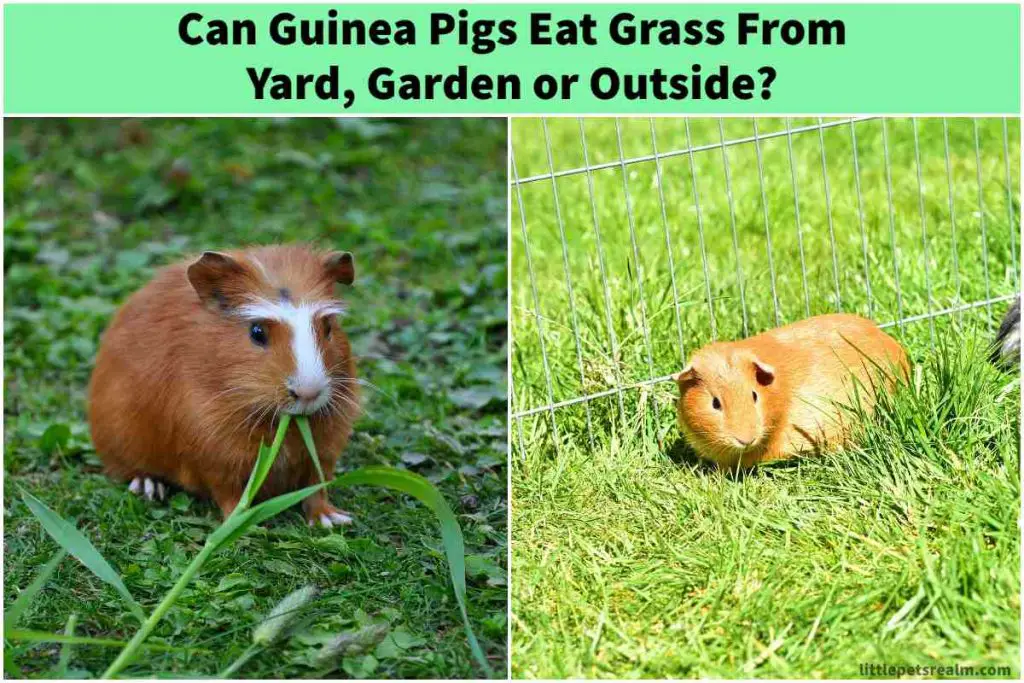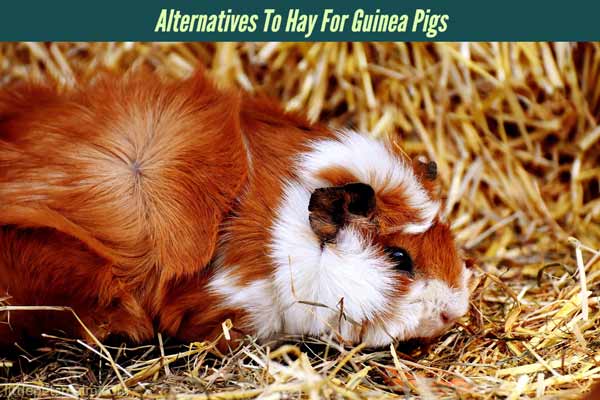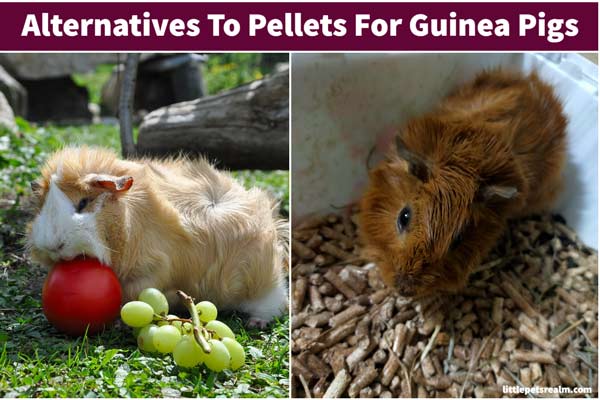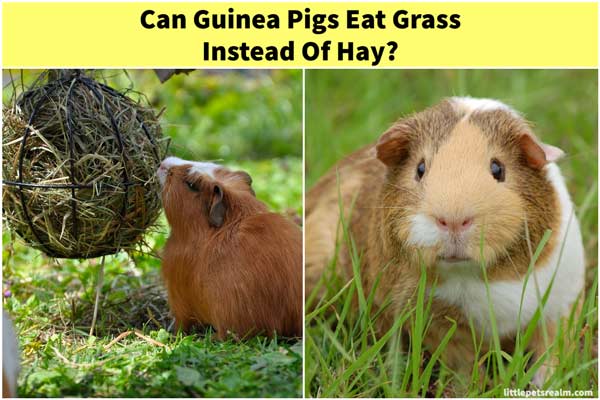As indoor guinea pigs are herbivores, you may think of feeding them grass from outside, without buying it. But, the question is, Can guinea pigs eat grass from your yard?
Guinea pigs can eat fresh grass safely from the yard or garden that don’t contain doesn’t contain pesticides, fertilizers, chemicals, weed, and animal poop or urine. Moreover, don’t feed them wet grass or grass clippings. Guinea pigs love to eat fresh grass because of their nature.
Fresh grass is a good alternative to hay. However, you must be careful before feeding them grass from the yard, garden, or outside as the wrong types of grass can make them seriously ill.
Let’s know what types of grass you should or shouldn’t feed your little piggies and what precautions you should take to let them graze from outside.
Table of Contents
Can guinea pigs eat fresh grass?

Though it seems unlikely, guinea pigs can eat fresh grass. In fact, their wild ancestors’ were natural grazers. Many indoor guinea pigs will like to eat fresh grass more than hay if you provide both at the same time. The nutritional value of fresh grass is also similar to that of hay if you can ensure the safety of your piggies.
However, you also have to keep in mind that an indoor guinea pig’s digestive system and body need hay or dried grass more than fresh grass. So, try to provide them hay as much as possible.
Even if you feed them fresh grass, it should not replace the hay. It’s fine if you feed it occasionally or as a part of a balanced diet, but not alone.
Know the difference between hay and fresh grass before you choose one.
Which type of grass is safe for guinea pigs to eat from the yard or outside?
Fresh grass can be served to guinea pigs if you choose the right kind of grass and maintain the quality. So, let’s know about the kind of grass that you can feed your guinea pigs.
Grass containing no lawn chemicals
Grass should never have any lawn chemicals like fertilizers, pesticides, and others. It must be completely free from chemicals to ensure safety. So, before you put your guinea pig’s in the yard, you must know about it.
Dried grass
Dried grass is friendly for guinea pigs like hay because wet grass causes skin infections when they walk on the surface and gut issues after they eat grass. Dried grass good for digestion and dental health as well.
Timothy grass
This type of grass is the most popular grass for guinea pigs. It contains all nutrients that guinea pigs need and they also love to eat them.
Orchard grass
Another great choice for guinea pig owners to feed them is western orchard grass. You can also go with it, though it has a bit less nutritional value than timothy grass. However, it’s a good alternative if your guinea pig is allergic to timothy grass or hay.
Know the difference between timothy and orchard grass.
Organic oat grass
Guinea pigs can also eat oat grass. You can grow it or get it from a pet store or farm and feed them. But, you have to use it as a treat only, not for the main diet. Don’t offer them too much oat grass, because it can cause digestive problems.
Grass root
Guinea pigs can also eat grass-root, even with dirt without having any issue. That can help maintain their tooth health by controlling the length of the teeth.
Less dusty grass
Good quality grass should be free from dust. Dust causes respiratory problems and allergies to your piggies.
Which type of grass can’t guinea pigs eat from the yard or outside?
Let’s take a look at the types of grass that your guinea pigs can’t eat from the backyard or outside.
Grass treated with pesticides and fertilizers
Guinea pigs should never eat grass that contains pesticides, fertilizers, or other chemicals. These lawn chemicals will upset their tummy. They are poisonous to them and can be life-threatening.
Wet grass
Wet grass is also bad for guinea pig’s health. If you leave them on the wet grass, they will eat it. But, their body will get wet and they will be sick. This will cause hair loss, ringworms, and skin infections such as fungal infections or lesions. Moreover, wet grass isn’t good for their health after they eat.
Grass from a damp location
If the yard remains damp most of the time, you shouldn’t let your little piggies eat grass from there. This grass becomes moldy which’s dangerous for them.
Grass clippings
Feeding your guinea pig’s lawnmower clippings isn’t recommended. This will lead to various illnesses and gut digestion problems such as diarrhea, bloating, and more.
Snowy grass
In winter, if the grass is covered with snow, it’s not a good idea to give them those grass. They will become ill. You should keep them warm and provide dried grass.
Weeds in the grass
Weeds are toxic to guinea pigs and can lead to serious illness. So, don’t let them eat grass when there are weeds.
Grass containing other animals poop or pee
If you have other pets such as dogs or cats at your home and they use your yard or garden for their toileting, you should let your guinea pigs eat grass from that place. It’s harmful to the piggies.
Besides, if the grass is on an open space where there is a chance of having bird droppings on grass, it will also be dangerous for them.
Is fresh grass from the yard good for guinea pigs?
Grass from the yard is good for guinea pigs until you can maintain the quality of the grass. Fresh and ideal grass can provide a lot of nutrition such as fibers, protein, fat, vitamin C, minerals, and other essential vitamins. Fresh grass also contains abrasive silica that can help control the growth of piggies’ teeth.
The two most important nutrients for your body are vitamin C and high fiber. They can’t produce vitamin C in their body. So, if they don’t get vitamin c from an external source, they will have scurvy and other health conditions. Scurvy causes the bone and dental diseases and also fetal.
Fresh grass can provide vitamin C and prevent these diseases.
Abrasive silica is essential for them to prevent teeth from growing too long. They will continuously chew and grind the fresh grass. This helps improve dental health.
Moreover, high fibers are mandatory as indoor guinea pigs are herbivorous. Fresh grass contains high fibers that improve their digestive system.
Fresh grass also contains omega 3 fatty acids that are required for heart health and omega 6 fatty acid that’s good for the skin.
So, if you can ensure good quality grass, it’s good for your guinea pig’s health.
However, it doesn’t mean, you must provide them fresh grass every day. It’s more important to give them unlimited hay that can do better than grass. Also, you have to add fresh green vegetables, fruits, and vitamin C supplements.
Precautions that you should take to feed guinea pig’s grass from the yard
Though you can feed guinea pigs fresh grass from the backyard, you need to be careful about the following factors.
Be careful of pesticides and fertilizers
Any chemicals like fertilizers and pesticides can be life-threatening for guinea pigs. That’s why ensure that the grass doesn’t have any of those substances. Even if it has those chemicals, don’t plan to wash that grass and feed you guinea pigs. It will still remain toxic for them. So, completely avoid grass from that lawn or garden.
Introduce to grass slowly
Indoor guinea pigs are more familiar with hay and other foods than fresh grass. So, if you decide to feed them fresh grass, do it slowly. Otherwise, it will cause digestive upset and other illnesses.
Provide them the minimum amount of grass and see it cause any health or digestion problems.
Then, increase the volume gradually. But, also make sure that they don’t eat too much grass. It can also be bad for them.
Avoid grass clippings
You should know which types of grass you want to feed them. Since grass clippings aren’t good for them, you must stay from them.
Be aware of animal toilet
If the grass you want to provide your guinea pig is located in an open space, it may contain animal poop or urine and bird’s dropping. Make sure grass is totally free from those.
Ensure the grass isn’t wet
As wet grass can cause skin diseases if they come in contact with that, make sure the grass dry enough.
Remove the weeds
Weed may grow in the yard which is poisonous for the piggies. So, you need to check it out and remove all the weeds before you put them in the yard.
Check for the intestinal parasites regularly
When you let your guinea pigs eat grass from your yard or outside, there is a chance that they get pesky parasite eggs from the grass or soil. So, you have to check for it routinely and perform deworming.
Provide balanced diet
Fresh grass can’t maintain your piggy’s body alone. Yes, it’s good to feed them fresh grass sometimes. But, focus more on serving them a large amount of hay that’s their main food.
Furthermore, give them fresh leafy vegetables, fruits, water, vitamin C supplements, and pellets to ensure a balanced diet.
Ensure yard is less dusty
Guinea pigs will have breathing problems and serious respiratory illnesses if they are exposed to too much dust. So, you have to make sure that your yard and grass have less dust as possible.
Make sure other animals don’t use the grass surface for toileting
If you have other pets at home or other animals can enter into the area where you want to put your little piggies for grazing, check if there is poop or pee on the animals.
Can you grow grass for guinea pigs in your yard, garden, or indoor?
You can grass in the yard or garden to feed your guinea pigs. You can also grow fresh grass indoors in a flower pot or container with soil if you don’t have a yard or lawn. Timothy or orchard grass can be a great idea to grow for your little piggies. You can also organic oat grass to grow for them.
If you grow fresh grass in the yard or garden, especially for them, make sure it’s friendly for them. After the grass grows from seed, you can put them in the yard or garden and they will start eating the fresh tasty grass.
If you grow it inside your home in a flower pot, you can pull out the grass and serve your guinea pigs inside a hay rack.
Take care of the grasses until they grow. Apply water regularly and stay away from using fertilizers or pesticides.
Can guinea pigs eat grass from outside?
You can offer your guinea pigs grass from outside if you can maintain the quality and their health safety. Try to offer them timothy, orchard and oat grass. Dried grass from a farm is a great food for them. If you provide fresh grass from outdoors, make sure the grass is free from any lawn chemicals and doesn’t contain grass clippings or weeds.
Can guinea pigs eat grass from the garden?
You can feed your guinea pigs grass from your garden if it falls into a type of grass that’s safe for them and isn’t treated with fertilizers and pesticides.
Do guinea pigs like fresh grass from outside?
Guinea pigs like to eat fresh grass from outside as their ancestors lived on the grass in the wild. Some guinea pigs will love more fresh grass from outside than hay or pet foods that you get in pet stores.
How much fresh grass can guinea pigs eat?
Guinea pigs can eat as much fresh grass as their digestive system supports. That means, different guinea pigs may need different amounts of grass. It also depends on diet and other foods that you eat everyday. However, you can’t provide grass in large volume for the first few days as they aren’t used to it.
You can add more grass to their diet slowly over time or it may lead to diarrhea, gas production and other digestive tract issues. Once they get used to fresh grass, they can eat as much as they can.
But, just like any other food, be careful of getting your piggies overweight and try to control it when you see they are over-eating.
Takeaways
Should you feed your guinea pigs grass from the yard? It’s not necessary to feed your guinea pig’s grass from the yard or outside. But, you may consider offering them fresh grass occasionally if they like it and you can provide them safe and good quality grass.
Grass can also be helpful in case you run out of hay or there is a delay in delivering the product
However, you shouldn’t try to make fresh grass your guinea pig’s primary food as it has many drawbacks in the long run.

I am Pallab Kishore, owner of Little Pets Realm. I share important tips, advice and answer all the queries to solve various problems about small pets such as guinea pigs and hamsters on this website.



